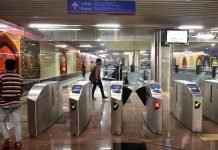MEERUT (Metro Rail News): Delhi-Meerut RRTS, India’s first high-speed Regional Rapid Transit System (RRTS) will have multi-modal integrations at its stations with public transport such as bus terminals, Railway stations and Metro stations. This integration will be done through walkways, lifts, escalators and underpasses wherever possible says National Capital Region Transport Corporation’s (NCRTC) group general manager (strategic planning), Sudhi Kumar Sharma.
“In view of the problem of road congestion and pollution faced by the public, we are creating an infrastructure which will ensure seamless integration within the public transport modes like Railway stations, bus terminus and Metro stations,” Sharma said.
The RRTS would provide seamless integration with Delhi Metro’s Hazrat Nizamuddin station along with Sarai Kale Khan ISBT and Hazrat Nizamuddin Railway Station. Similarly, Anand Vihar RRTS station would have seamless connectivity with Anand Vihar Metro station along with Anand Vihar ISBT & UPSRTC bus depot (Kaushambi), he added.
New Ashok Nagar & Ghaziabad RRTS station would also have connectivity with New Ashok Nagar Metro and Ghaziabad New Bus Adda Metro respectively. The Sahibabad RRTS station would be connected to either Delhi Metro’s Line 3 or 4. From Meerut South till Modipuram, the Meerut Metro will share the same infrastructure as RRTS. Bus Depots will also be seamlessly connected with RRTS stations at Sahibabad, Ghaziabad, Modinagar North, Bhaisali and Begumpul. The total project cost of Delhi-Meerut RRTS is Rs 30,274 crore.
NCRTC is mandated to design, construct, finance, operate and maintain RRTS in NCR. It works under the administrative control of the Ministry of housing and urban affairs (MoHUA). Recently, we organized a community interaction programme at Guldhar, Ghaziabad and briefed the local stakeholders about the RRTS project, its ongoing construction progress and upcoming challenges.
These stakeholders included local residents, shop owners, restaurant owners and local educational institutions, Sharma said. “We also informed them that the barricading which will be done during construction on the road will be in such a manner that causes minimum inconvenience to commuters. The basic aim was to make the process of developing this state of the art infrastructure as inclusive as possible,” he added.
Delhi-Ghaziabad-Meerut RRTS corridor is first of the three prioritized corridors planned for implementation in Phase-1. The other two are Delhi-Gurugram-Alwar and Delhi-Panipat corridors. Metro services with 12 stations on 18 km stretch between Modipuram and Meerut South stations on RRTS infrastructure will meet the local mobility needs of citizens of Meerut, besides providing efficient regional connectivity.








